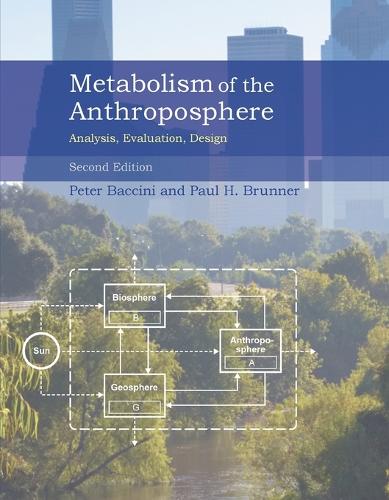
Metabolism of the Anthroposphere, second edition: Analysis, Evaluation, Design
(Paperback)
Publishing Details
Metabolism of the Anthroposphere, second edition: Analysis, Evaluation, Design
By (Author) Peter Baccini
By (author) Paul H. Brunner
MIT Press Ltd
MIT Press
31st October 2023
United States
Classifications
General
Non Fiction
Environmental science, engineering and technology
304.2
Physical Properties
Paperback
408
Width 178mm, Height 229mm
369g
Description
Over the last several thousand years of human life on Earth, agricultural settlements became urban cores, and these regional settlements became tightly connected through infrastructures transporting people, materials, and information. This global network of urban systems, including ecosystems, is the anthroposphere; the physical flows and stocks of matter and energy within it form its metabolism. This book offers an overview of the metabolism of the anthroposphere, with an emphasis on the design of metabolic systems. It takes a cultural historical perspective, supported with methodology from the natural sciences and engineering. The book will be of interest to scholars and practitioners in the fields of regional development, environmental protection, and material management. It will also be a resource for undergraduate and graduate students in industrial ecology, environmental engineering, and resource management. The authors describe the characteristics of material stocks and flows of human settlements in space and time; introduce the method of material flow analysis (MFA) for metabolic studies; analyze regional metabolism and the material systems generated by basic activities; and offer four case studies of optimal metabolic system design- phosphorus management, urban mining, waste management, and mobility. This second edition of an extremely influential book has been substantially revised and greatly expanded. Its new emphasis on design and resource utilization reflects recent debates and scholarship on sustainable development and climate change. An overview of the cultural evolution of material flows and stocks with an emphasis on the design of metabolic processes in urban systems. Over the last several thousand years of human life on Earth, agricultural settlements became urban cores, and these regional settlements became tightly connected through infrastructures transporting people, materials, and information. This global network of urban systems, including ecosystems, is the anthroposphere; the physical flows and stocks of matter and energy within it form its metabolism. This book offers an overview of the metabolism of the anthroposphere, with an emphasis on the design of metabolic systems. It takes a cultural historical perspective, supported with methodology from the natural sciences and engineering. The book will be of interest to scholars and practitioners in the fields of regional development, environmental protection, and material management. It will also be a resource for undergraduate and graduate students in industrial ecology, environmental engineering, and resource management. The authors describe the characteristics of material stocks and flows of human settlements in space and time; introduce the method of material flow analysis (MFA) for metabolic studies; analyze regional metabolism and the material systems generated by basic activities; and offer four case studies of optimal metabolic system design- phosphorus management, urban mining, waste management, and mobility. This second edition of an extremely influential book has been substantially revised and greatly expanded. Its new emphasis on design and resource utilization reflects recent debates and scholarship on sustainable development and climate change.
Author Bio
Peter Baccini is Professor Emeritus at the Federal Institute of Technology, Zurich (ETH), where he was Professor of Resource and Waste Management. Paul H. Brunner is Professor at the Institute for Water Quality, Resources, and Waste Management at Vienna University of Technology.
